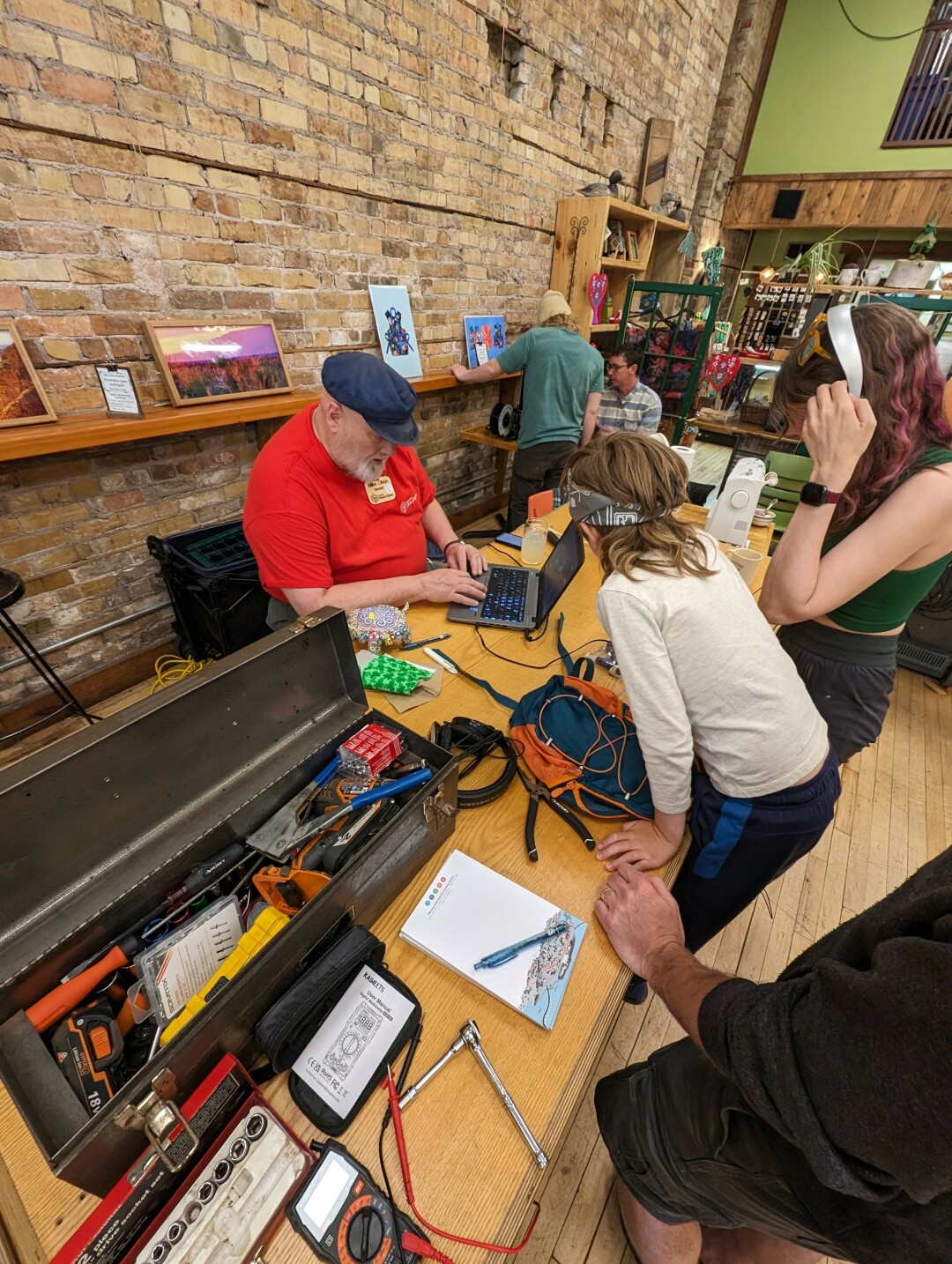News & Articles
Browse all content by date.

At the electronics table during the bimonsthly Fix-It Clinic.
Do you know what’s inside an Etch-A-Sketch?
I had no idea. And I had never really wondered or given it a second thought until I saw one opened up.
I had to lean over the shoulders of the father and child who had pried off the back and popped it open on a table. Behind that pink plastic case, the Etch-A-Sketch looked like a miniaturized ball pit of tiny beads and impossibly fine silvery dust criss-crossed by metal rods and curling wires.
The father pointed out how the wire seemed to have snapped. That explained why one of the Etch-A-Sketch’s controls hadn’t been functioning.
That Etch-A-Sketch had been thrown away at WLSSD’s Materials Recovery Center, but a staff member had set it aside in the hopes that someone might want to take it home, tinker with it, and give it a second life. That’s how it ended up on the table at Duluth Folk School during one of WLSSD’s recent Fix-It Clinics.
At the next table over, a volunteer offered advice on the right parts to buy for a food dehydrator that wouldn’t turn on. Another volunteer guided a couple through the process of replacing a frayed plug on their floor lamp. A couple of Fix-It Clinic participants who’d brought in ripped pants cheered each other on as they both learned the basics of hand-sewing a patch.
“At the end of the day, I don’t want to have grease on my hands,” volunteer Mark Lavalier told the woman whose bicycle he was helping to fix. “I’ll teach you what to do, but I want you to be the one holding the tools.”
His knuckles, though, were creased with lines of black grease, revealing that he wouldn’t hesitate to lend a hand.
That’s the spirit of the Fix-It Clinic: it’s about sharing knowledge, developing skills, and building capacity in our community. Fix-It Clinics celebrate the idea that just because something’s broken doesn’t mean it belongs in the landfill.
At each of these bimonthly events, the public is invited to bring in something broken from home – including furniture, clothing, electronics, appliances, toys, jewelry, outdoor & sporting gear – and they’re paired up with a skilled volunteer who will coach and assist them in making repairs.
Grown out of collaboration between WLSSD, Duluth Folk School, Duluth MakerSpace, and Northern Bedrock Preservation Corps, Fix-It Clinics aim to change the way we treat our stuff after it breaks, rips, cracks, frays or just stops working the way it’s supposed to. During any given event, about 30 to 50 items come through the door. Many participants leave with an item in good working order, some leave with clear instructions on a part or product to buy and instructions for using it, and a few go home knowing that though their item is beyond repair, well, they gave it their best shot.
In the grand scheme of things, those few dozen items saved from the landfill are a drop in the bucket compared to the thousands and thousands of pounds of stuff our community throws away every day.
But the Fix-It Clinic isn’t just about the things we keep out of the landfill today. It’s about changing the way we look at all our stuff, rethinking what is waste and what still has value. It’s about taking the time to appreciate our everyday things, the objects we see every day and often take for granted.
The more we consider the skills, materials, time and ingenuity that went into making our stuff, the more likely we are to hesitate before tossing them in the trash. Instead, we might fix the things that are broken and seek out new homes for the things that no longer suit our tastes. In the long run, it’s this shift in attitude that makes a real difference in our individual waste practices.
I know the cynics out there may spot another flaw in this logic: one person’s behavior change or attitude change is still a very, very small drop in the bucket of waste reduction on a regional scale.
Cynics, I invite you to join us at the next Fix-It Clinic. When you open the doors on a room full of strangers putting their heads together to troubleshoot vacuum cleaners, box fans, video game controllers and even the occasional Etch-A-Sketch, you’ll see collective action at work. You’ll see ordinary people supporting each other, encouraging each other, and holding each other accountable to a more sustainable future and a more resilient community.
The next Fix-It Clinic will be held at Duluth Folk School on Saturday, January 11, 2025 from 3:30–6 pm. Sign up in advance with a broken item (by visiting wlssd.com/fix-it or calling 218-722-3336 and asking for Fix-It resources) to be paired with a skilled volunteer and all the tools you’ll need to troubleshoot and repair your item. Walk-ins are welcome but not guaranteed a time slot.
If your item can’t be repaired during the event or requires specialty parts, we’ll help connect you to local professionals or other resources to get your item back in working order.
Don’t have something broken right now? Stop by the event to check out repairs in action or try your hand at fixing a broken item brought from WLSSD’s Materials Recovery Center. Kids are welcome! Every Fix-It Clinic has a Tinker Table where anyone can drop in for hands-on learning of fundamental repair skills.
Just want to see repairs in action? Drop in and check out what’s happening!
Curious about Fix-It Clinics? Looking for other repair resources? Have an unrelated weird waste question? Call us at 218-722-3336 or email info@wlssd.com to learn more.
Emma Pardini is an Environmental Program Coordinator at Western Lake Superior Sanitary District. She specializes in education and communications around recycling and solid waste reduction. This year, she finally learned how to patch a bike tire.
| Tweet |

